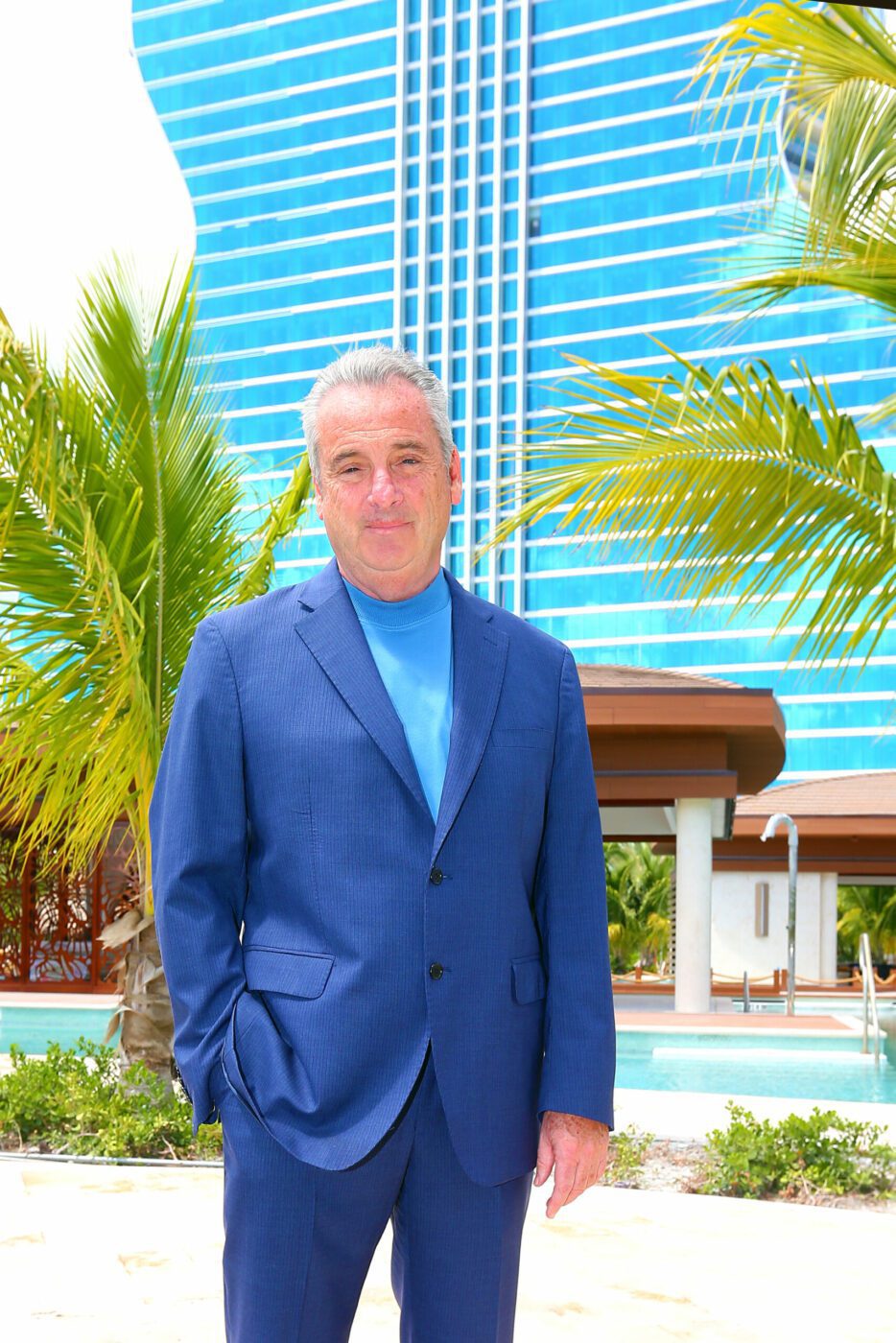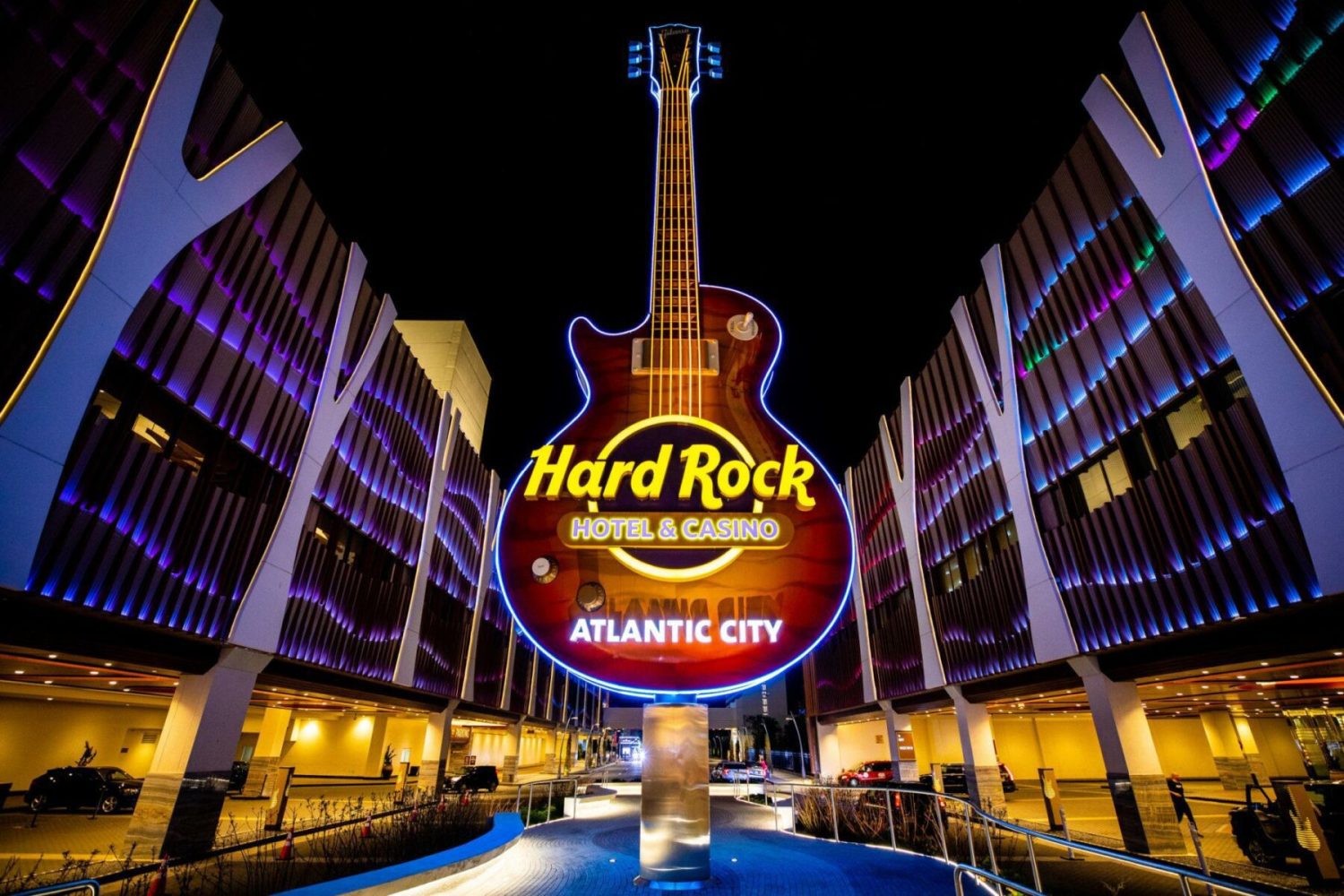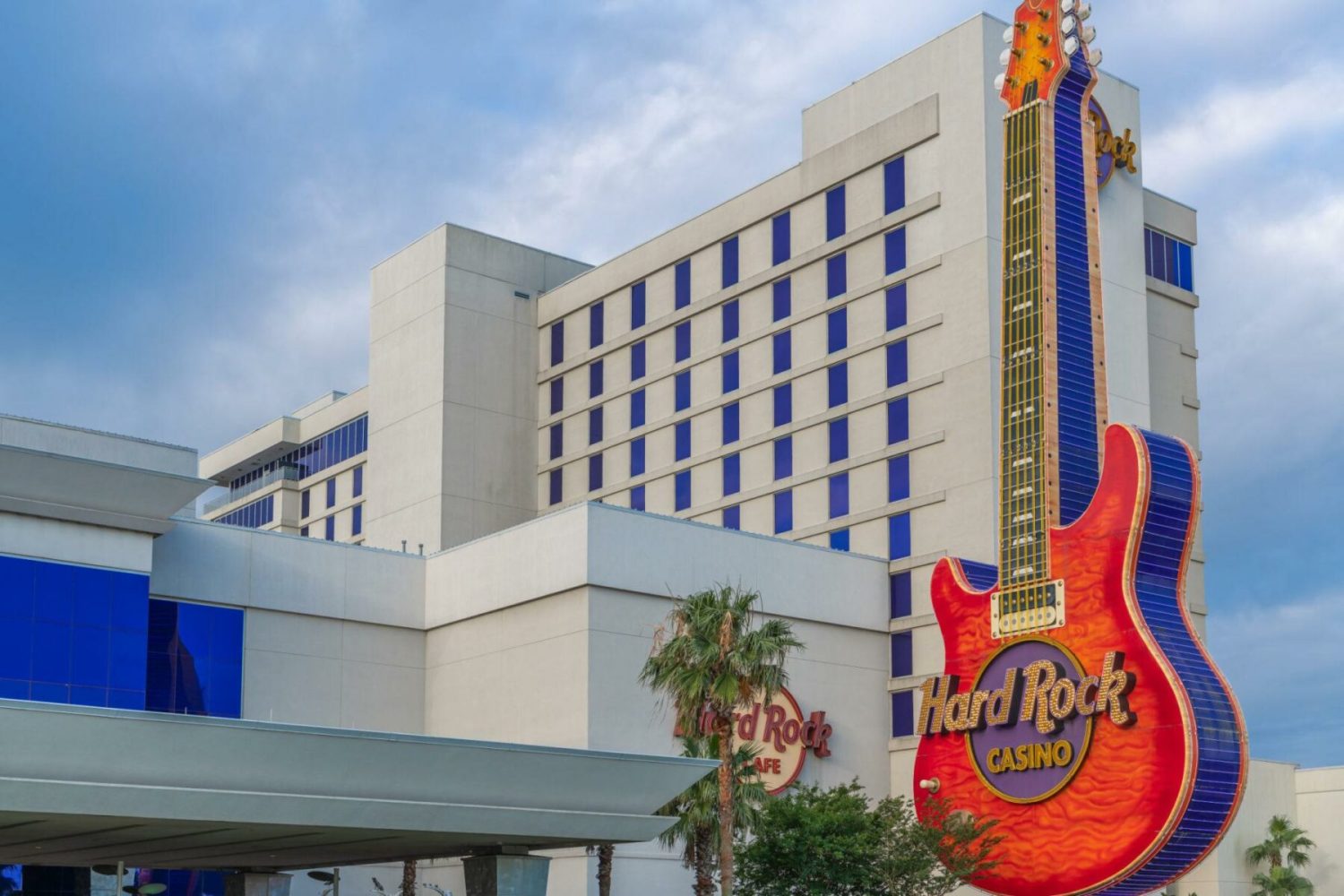Hard Rock International is shopping for a casino on the Las Vegas Strip, actively tracking progress toward a downtown Chicago gaming development, and pursuing integrated resort opportunities in Mexico City, Barcelona, and Japan.
That doesn’t mean Hard Rock’s plate is full.
CEO Jim Allen said the Florida-based company’s latest foray into online gaming offers another lucrative growth opportunity. In December, the company announced the creation of Hard Rock Digital, bringing aboard a leadership team that was responsible for the growth of several successful online gaming ventures.

Hard Rock CEO Jim Allen in front of the Guitar Hotel at the Seminole Hard Rock Hollywood in Florida/Courtesy photo
“Our business model is much different than some of the other big names out there,” Allen said. “We’re already in 76 countries around the world. Last year, we had 203 billion media impressions with the Hard Rock brand and over 130 million visitations to Hard Rock locations. Our need to create and buy a database may be different than other companies.”
The Hard Rock name is attached to some 250 non-gaming hotels and restaurants. The company spent $250 million in 2016 to attach its name to the NFL’s Miami Dolphins home stadium. The venue hosted the NCAA’s college football national championship game in January and Super Bowl LIV last year.
Allen suggested Hard Rock doesn’t need to spend millions of dollars on advertising and marketing campaigns to lure customers in order to build a successful online casino and online sports betting business.
“Our cost for customer acquisition and strategy is different for other companies starting at ground zero,” Allen said.
Allen, 60, who is also chairman of Seminole Gaming and Hard Rock Digital, has spent 20 years directing the gaming, hospitality, and entertainment operations for Florida’s Seminole Indian Tribe – which acquired Hard Rock International in a groundbreaking $1 billion deal in 2007.
Hard Rock’s casino business has grown beyond Florida, where Seminole Gaming operates six of the state’s seven tribal casino properties, including Hard Rock Tampa and Hard Rock Hollywood near Fort Lauderdale. In 2019, Hard Rock opened the $1.15 billion Guitar Hotel expansion at the Hollywood resort. The 638-room tower is shaped like the body of a guitar.
Hard Rock currently lists 14 casino properties in the U.S., Canada, and Punta Cana in the Dominican Republic. Three of the casino projects are in development. Allen said Guitar Hotels are planned for the proposed integrated resort ventures in Barcelona, Mexico City, and Japan.
Allen, in a half-hour phone interview with CDC Gaming, touched on several gaming industry topics and Hard Rock’s growth initiatives. Casino expansion remains at the forefront of the company’s business opportunities.
‘We’re aware of the rumors’
Hard Rock lent its name to the ownership of the off-Strip Hard Rock Las Vegas, which went through several management deals. The property was sold in 2018 and the new owner is partnering with Virgin Hotels and Mohegan Gaming, the casino operating arm of Connecticut’s Mohegan Indian Tribe. The property closed last year and will reopen next month.
In March, Hard Rock said it acquired the rights to the name Hard Rock Hotel Casino Las Vegas, along with the property’s music memorabilia, signage and merchandise, intellectual property rights for affiliated restaurant and entertainment trademarks, and website domain names.
“It was important for me to make sure we had control of the brand,” Allen said.
Where the brand is headed has been fuel for rampant speculation.
“We’re aware of the rumors,” Allen said. “But we’re not involved in any transaction at this point.”
Hard Rock has been linked to the Cosmopolitan of Las Vegas, which its private equity firm owner Blackstone Group said it was looking to sell in 2019. Hard Rock is also linked to Strip properties controlled by Caesars Entertainment. Company executives said they want to sell one or two resorts.
“We certainly think (Las Vegas), long term, is going to be the great gaming market in the United States,” Allen said. “We certainly are in no rush to buy something just to be there. It has to make sense for us on a long-term basis.”
Hard Rock has built casino resorts from the ground-up but went into Atlantic City and renovated as existing property. In 2017, Hard Rock paid Carl Icahn $50 million for the Trump Taj Mahal and spent $500 million to convert the facility into Hard Rock Atlantic City.
Allen, a longtime executive with the Trump Organization, Sun International, Park Place Entertainment, and Hilton Hotels, was acquainted with the Boardwalk property, one of two that he considered perfect for remodeling.
Hard Rock isn’t seeking any partners in Las Vegas, such as Hard Rock properties in Lake Tahoe, Nevada, which is operated by Paragon Gaming, and Biloxi, Mississippi, where the resort is managed by Bally’s Corp. Allen said control of the Hard Rock brand is a primary focus, especially with the company preparing to launch a casino customer loyalty program.
In Ohio, Hard Rock leases Hard Rock Cincinnati in partnership with real estate investment trust VICI Properties. But Allen, while speaking highly of the VICI team, said a REIT deal is not on the horizon.
“We want to be careful with that as a financial instrument,” Allen said. “Were not an organization that needs to liquidate cash out of the business. We don’t want to enter into a relationship that creates a windfall today that could potentially be a different business model five or 10 years down the road.”
Allen said Hard Rock is considering the downtown Chicago opportunity but also is working with a local partner in Rockford, Illinois – roughly 90 minutes west of Chicago – on a casino-hotel property that was authorized as part of Illinois 2019 gaming expansion legislation.
‘A masterplan of 300 acres’
The Seminole Tribe is considered one of the more influential tribal gaming operators in the U.S. Allen said the tribe has ways to grow its brands – Hard Rock and Seminole Gaming – in the Sunshine state.
He suggested the tribe could explore a hotel expansion at its Tampa resort and has a masterplan of 300 acres in South Florida where it could add another hotel-casino project.
The other growth effort could be sports betting. Florida voters in November 2018 overwhelmingly approved a constitutional amendment, backed by the Seminoles, that limited future casinos outside Indian reservations.
Allen said the tribe has the ability to offer the state $500 million a year in revenue sharing. He said several “legitimate” independent studies on Florida sports betting show the activity would have a cash flow profit of between $200 million and $280 million a year.
“We feel the state may be interested in working with us to reinstitute our revenue share and if that is the mindset of the state, we’re happy to sit down and discuss it,” Allen said. “We’ve always had a good relationship (with Florida) in my 20 years.”
‘Our business model is operating profit’
Hard Rock is already operating sports betting in three states – New Jersey, Iowa, and Mississippi. The launch of the digital business will serve as a vehicle to expand sports betting into other markets and online casino, which is currently offered in New Jersey.
Allen is bullish on Hard Rock Digital because of the team brought on board.
Executive Chair Rafi Ashkenazi and CEO Marlon Goldstein were both executives with The Stars Group. President Matt Primeaux was with Fox Bet.
Allen said the new company is positioned for a three-year-to-five-year growth trajectory, based on investment analyst projections of a $7 billion market in the U.S. for sports betting and $14 billion for online gaming.
“Our business model is operating profit and (cash flow),” Allen said. “A lot of these companies are just driving revenues trying to get market share. We’re not suggesting that it’s right or wrong. But we are looking at this on a long-term basis.
Howard Stutz is the executive editor of CDC Gaming. He can be reached at hstutz@cdcgaming.com. Follow @howardstutz on Twitter.







